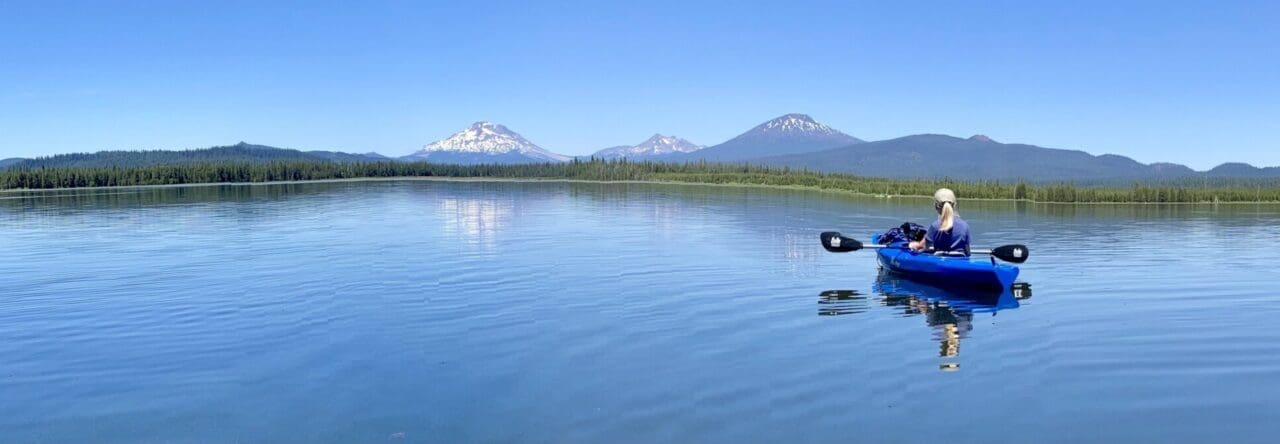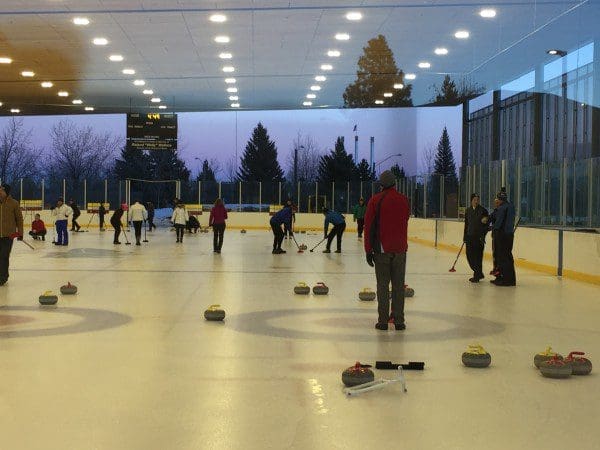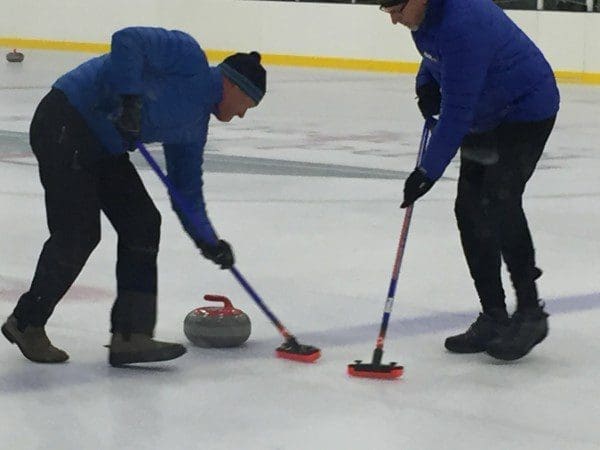I now know everything there is to know about curling, that most fascinating of all Olympic sports.
Four players to a team. The first player bowls the 42-lb marble stone, which glides down a long runway where it can careen off the other players’ stones and send them sprawling (the stones, not the players). The closest stone to the intended goal earns points. While a whole lot of sweeping is going on.
Basically, a combination of bowling, pool, horseshoes, shuffleboard and janitorial services. On ice.
Janitorial services on ice at the new Bend Parks & Rec ice rink
Jim — from my Walking-4-Wellness-coffee-drinking posse — grew up in Wisconsin where, in the winter, apparently there isn’t much to do except play games on frozen surfaces.
So a group of us Walking-4-Wellnessers came out to cheer him on in his curling game (but mostly to huddle around the outdoor fire pit in between the exciting action).
I’m always up for learning new things. Part of the reason I wanted to watch Jim curl was because I was curious about this Olympic sport that was mind-befuddling, i.e., why are they sweeping the ice with brooms?
In the words of that great philosopher, Dr. Seuss:
The more that you read, the more things you will know.
The more that you learn, the more places you’ll go.
I’m up for learning and going places. But I would have to say that as important as *understanding-curling* is, it probably won’t make the Top Ten list of most essential things you need to know in order to go places.
We most often learn the best lessons from our life experiences. But experience can be a cruel taskmaster.
In no particular order, here are 9 essential things Hubby and I learned from that ruthless teacher, cancer:
1. Live gratefully in the present. I stood at my large window, wrapped in fleece blanket, watching snow fall. How can white against dark gray be so beautiful? And why was I granted eyes to see it? And how can this steaming mug of honeyed tea warm my hands and taste so good on my tongue? And why am I allowed this breath … and this one? Why am I this blessed? Although we still planned for our future, cancer taught Hubby and me to intentionally live in the present; to notice and speak gratitude for the goodness, even in the heart-breakingly hard.
2. Persist persist persist. Be tenacious; don’t quit easily. Learning this will serve you well in life, unlike learning, say, curling. Hubby had tenacity. He wasn’t supposed to live as long or as well as he did. But he persisted forward with life while he still had it. I love this word, tenacity. I love that I was married to a stubborn tenacious man.
3. Give back. Hubby and I published a book of 28 short stories of survivors and caregivers who found meaning and purpose from cancer. These people provided college scholarships. Knitted prayer shawls. Organized fund-raisers. Created peer support systems and connected people. Stitched hundreds of lap quilts and delivered them to chemo patients. A house was built on hospital grounds for families traveling for treatment. All brought about by ordinary people who found a way to bring meaning to their lives despite—or maybe because of—a challenging diagnosis.
4. Live open-heartedly. Be open to new experiences, new friendships. Tell your story. You never know who you might encourage by opening your heart in vulnerability to share your wounds, your failures, your victories.
5. Take risks. Live a strong and fierce life. Be willing to step into uncomfortable places if it means making life better for others, or if it means trying something new for no other reason than to banish the fear.
6. Nurture relationships. Success in relationships spills over into success in life. Cultivate your marriage. Strengthen connections with your children and extended family members. Cherish your friendships; develop new ones. The number of people in Hubby’s corner grew with cancer, and each one was a significant part of our support team.
7. Take care of your health. Cancer taught us the importance of regular physical activity, eating better and managing stress. We explored the nearby mountain trails with hiking boots laced up, snow-shoes strapped on; we ate more fruits, veggies, whole grains and legumes; and we managed the stress of cancer via outdoor activity, a standing Friday date night, keeping thanksgiving lists.
8. Create memories. What if you just accumulated stuff instead of creating adventure and accumulating memories with the people most important? How successful would that be? Hubby and I explored more places across the country in the final ten years of his life than we did in the first thirty-one years of our marriage. I cherish the photos and memories of so many miles together along trails in the Oregon Cascades, Wyoming Tetons and Colorado Rockies; historic sites in New England; the Grand Canyon, Albuquerque and San Antonio; and the beaches and swamps of Florida.
9. Slow down. Take deep breaths. I—who tend to measure my worth by how many items I check off my to-do lists—have learned to rest still. Rest, knowing that I am deeply loved by Father God, that He holds everything in His capable hands.
So, why is it important to keep learning? Even if the lessons are painful?
Easy. Because learning means we’ll keep growing. It makes us more interesting. It means we’re stretching ourselves outside of ourselves.
And this not-being-wrapped-up-in-ourselves is always a good place to be.
What about you? What do you need to do to be more open to learning/growing experiences? Is there a comfortable place you’re being nudged out of? Can you embrace the uncomfortableness?
P.S. If you found this post helpful or interesting, please share, tweet or pin.



Leave a Reply